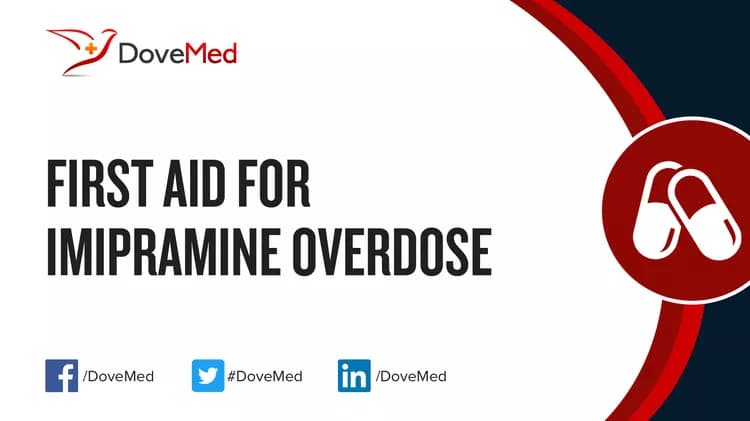What is Imipramine Overdose?
- Imipramine (also known as melipramine) is an anti-depressant medication. It constitutes a class of drug known as tricyclic depressants (or TCAs)
- Imipramine Overdose is the accidental or intentional intake of the drug in dosage higher than the prescribed values
- The condition is diagnosed based upon the clinical history, combination of signs and symptoms, and additional tests (that may include, in some cases, radiological studies and laboratory tests)
Imipramine Overdose may be also referred to as the following:
- Janimine Overdose
- Melipramine Overdose
- Tofranil Overdose
What are the Causes of Imipramine Overdose?
- Imipramine Overdose is caused by the intake of imipramine containing medication in an amount that is higher than recommended
- This intake could be accidental, or in some cases intentional, to bring self-harm
- It is sold as Antideprin, Janimine, Tipramine, Tofranil and Berkomine among others.
Note: The drug can interact with other prescribed or non-prescribed medications in the body. Such interactions may enhance the therapeutic effects of the drug or other medications being taken, resulting in undesired side effects (such as an overdose).
What are the Signs and Symptoms of Imipramine Overdose?
The signs and symptoms of Imipramine Overdose can vary from one individual to another. It may be mild in some and severe in others. Several systems of the body, such as the digestive system, nervous system, vascular system, respiratory system, skin and ENT may be affected.
The signs and symptoms of Imipramine Overdose include:
- Increased heart rate; irregular heart beat
- Drowsiness, stupor
- Dry mouth, dry skin and eyes
- Difficulty urinating
- Nausea and vomiting
- Constipation
- Confusion, agitation
- Hallucination
- Mild to severe headache
- Lack of muscle coordination
- Vision abnormalities including blurred vision; dilated pupils
- Respiratory distress
- Seizure
- Coma
How is First Aid administered for Imipramine Overdose?
First Aid tips for Imipramine Overdose:
- Imipramine Overdose is a life-threatening condition. If an individual is suspected to have overdosed on imipramine, call 911 (or your local emergency number) for emergency assistance immediately
- Call the Poison Control Center at 1-800-222-1222 (or your local poison control center) for further instructions
- Determine the amount and type of drug taken, time of consumption, patient’s age, weight, and general health status
- Confirm that the airways are protected; also, ensure breathing and the presence of pulse
- Take individual to emergency room for further treatment
- Always try to take the medication strip/bottle/container to the ER
The emergency medical health professional might take the following steps towards treating the overdose:
- Administer laxatives for elimination of drug
- Gastric lavage for elimination of drug from the stomach
- Administer activated charcoal to prevent absorption of the drug
- Medically manage symptoms, such as abnormal heart rate and breathing difficulty
- Also, relieve respiratory distress with an artificial respirator and administer fluids by an IV drip
- Administer sodium bicarbonate, which is an imipramine antidote
Who should administer First Aid for Imipramine Overdose?
First aid for Imipramine Overdose is administered by healthcare professionals.
- The individual who overdosed, or someone near, should call 911 for emergency assistance (or the local emergency number)
- They should also call the poison control center at 1-800-222-1222 (or the local poison control center) and follow instructions
What is the Prognosis of Imipramine Overdose?
•Imipramine Overdose is a life-threatening condition due to severe heart-rate irregularities and respiratory distress caused by the drug. Severe cases of drug overdose can be fatal
- The prognosis of the overdose is dependent on the amount of drug taken, time from overdose to treatment, severity of the symptoms, and general health status of the affected individual
- In case of complications including pneumonia, unconsciousness, or coma, it may considerably worsen the outcome. Damage to the brain may become irreversible, if timely oxygen therapy is not administered
In general, overdoses are common situations in the emergency departments. A majority of the cases are often not fatal, when appropriate treatment is given.
How can Imipramine Overdose be Prevented?
Imipramine Overdose can be prevented by:
- Exercising caution while taking multiple drugs with imipramine
- Avoiding drugs that interact with imipramine
- Exercising caution while taking other anti-depressants while already taking imipramine
- Monitoring the intake of individuals, who are known to be depressed or suicidal
- Keep medications out of reach of children in child-proof containers
- For older individuals and those who tend to be forgetful, medications should be stored in single dose containers with time labels, to avoid multiple dosage
- Monitor intake of this drug especially in patients, who have depression or harbor suicidal thoughts and behavior
It is important to give your healthcare provider a complete list of prescription and non-prescription medications that are being currently taken. This will help them in assessing the possible drug interactions within various medications and help avoid/prevent accidental or unintentional toxic drug effects.
What are certain Crucial Steps to be followed?
- Call 911 (or your local emergency number) for emergency assistance, if symptoms are life-threatening
- Call Poison Control Center at 1-800-222-1222 (or the local poison control center) and follow the recommend steps
- It would be helpful if the following information is readily available:
- Type, dosage and time of administration of medication
- Age and weight of the individual
- And, the overall health status of the individual
Related Articles
Test Your Knowledge
Asked by users
Related Centers
Related Specialties
Related Physicians
Related Procedures
Related Resources
Join DoveHubs
and connect with fellow professionals


0 Comments
Please log in to post a comment.